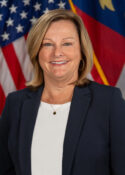A LITTLE ABOUT US
The North Carolina Emergency Management Association is the professional organization for emergency managers in North Carolina.
Each year the Association hosts a Spring Conference and a Fall Conference; where participants can gather together
and learn more about what is happening in the field of emergency management and also build relationships with their peers.
Please take some time and look around our site, if you have questions feel free to Contact Us.
You can find our bylaws and other governance/structure documents on the Documents and Resources Page.
NCEMA has twelve standing committees to support the business of the Association;
as well as provide an opportunity for our members to offer their input and be involved in the Association.
NOTE: Committee meeting minutes can be accessed through the
“Read More News” box under the above “RECENT NEWS” section of this website.
Chair: Sandy Wood (Johnston County Emergency Management and NCEM Association President)
Duties: The Executive Committee shall be the governing body of the Association and shall have the authority to take appropriate measures required to accomplish the goals and objectives of the Association. The Executive Committee shall, by issuing rules, establish a formal procedure for the conduct of the affairs of the Association in accordance with the provisions of the constitution and by-laws. If in the Committee’s opinion, a question must have the approval of the membership, the Executive Committee may call a special meeting of the Association membership or allow for voting at any normally scheduled general membership meeting. The Executive Committee shall establish representatives and ad hoc committees on a case-by-case basis to further the purposes of the Association. The Executive Committee shall supervise the activities of the Executive Director.
Chair: Daniel Webb, Edgecombe County Emergency Management
Duties: Responsible for the development of award and scholarship competition guidelines, membership notification soliciting award nominations and scholarship applications, review of award recommendation packages and scholarship applications, selection of recipients, and presentation of awards at the Association’s Fall Conference and scholarship(s) at the Spring Conference. The committee will determine the recipients of awards and scholarship(s) in accordance with standard selection criteria and guidelines approved by the Executive Committee and the general membership of the Association. If, in the opinion of the Awards Committee, an awards category receives no nomination which meets the established standard, the committee may decide that no award shall be presented for this category. If no scholarship applications are received, the committee will make no scholarship award. Membership in the Awards Committee shall consist of (10) members total, (3) members elected from each branch (Central, Eastern and Western) and a Chairperson which will be appointed at large by the President to facilitate the Committees duties and only vote in the case of a tie.
Chair: Jason Burnett (Cabarrus County Emergency Management)
Duties: Responsible for the periodic review of the governing rules of this Association; in order to ensure the document truly reflects the organization’s structure and activity. Monitor adherence to provisions of the constitution and by-laws and review administrative policies and procedures with the Executive Committee for consistency to the constitution and by-laws. Receive, review and evaluate proposed changes to the constitution and by-laws as either (1) submitted by the Association’s membership, (2) requested by the Executive Committee, (3) necessitated by outside influences, such as changes in laws or other instruments that supersede the organization’s authority or (4) determined by the committee to be in the best interests of the organization. Prepare and submit to members a consolidated listing of proposed changes to the constitution and by-laws at least ten days in advance of any general membership meeting. During general membership meetings, present all proposed changes to the constitution and by-laws to the Association for consideration and vote for adoption.
Chair: Drew Pearson (Dare County Emergency Management)
Duties: Develop, monitor, and maintain the legislative priorities of the Association; coordinate legislative strategy sessions to help define the Association’s legislative agenda; and prepare and promote the Association’s legislative agenda. Remain aware of all proposed legislation at the federal, state and/or local level that may impact emergency management activities or the goals of the Association. Make recommendations to the Executive Committee, and/or the membership, regarding Association positions relative to legislative issues and request action by the members, as appropriate. Maintain liaison with state and federal legislators and appropriate associations, committees, and task forces in matters relating to emergency management. Provide education information to federal and state legislators pertaining to issues important to the emergency management program. Draft legislation and testify for or against legislation as appropriate and as directed by the Association; informing the President prior to taking any direct action with the state legislature or Congress. This committee will also coordinate with emergency management organizations at the national level in support of the emergency preparedness program.
Chair: Aaron Stryker (Onslow County Emergency Management)
Duties: Make recommendations concerning the development and maintenance of a strong, active membership and actively seek new members in all membership categories of the Association. Committee members will oversee Association marketing strategies in order to increase membership and will provide information to other agencies, associations, businesses, and individuals regarding the significant role the Association plays in furthering effective “emergency management” throughout our State.
Chair: William King (Alamance County Emergency Management)
Duties: Select capable, qualified candidates for nomination as elected officers of the Association. Solicit nominees from the membership, confirm interest and qualifications of all candidates, and compile a slate of contenders prior to the general membership meeting conducted in conjunction with the Fall Conference. During the Fall general membership meeting; present candidate listing to Association President, who will accept nominations from the floor, and conduct the election in accordance with Robert’s Rule of Order. Current elected officers of the Association are excluded from serving as members of the Nomination Committee. Membership shall consist of seven (7) active members; two members each from the three NC/EM Branches plus one member at large.
Chair: Bobby Arledge (Polk County Emergency Management)
Duties: Plan, coordinate and develop the agenda for all Association sponsored state-wide conferences. The Committee will be responsible for all facets of the conference activities; including topics, schedule, speaker identification and support, program document design and the coordination of any training or seminars offered in conjunction with the conferences. The committee will also participate, as requested by the Executive Committee, in developing the program for any other Association sponsored events. These duties include selecting a site for the Spring and Fall Conferences, in the best interest of the membership. On a year-to-year basic, consideration should be given to rotate conference placement among differing geographic sections of the State; in order to both afford a variety of locations for attendees and preclude recurring lengthy travel for any particular membership group. The committee will also participate, as requested by the Executive Committee, in identifying locations and facilities for other Association sponsored events.
Chair: Zak Whicker (New Hanover County Emergency Management)
Duties: Serve the Association’s leadership and membership as the focal point for technology issues, utilizing both existing and emerging technology as it applies to the overall emergency management community. The committee will manage and maintain the Association website to ensure its availability to distribute information in a timely and useful manner. The committee will establish a network bringing together Association member emergency management practitioners/educators to enhance and improve the provision of emergency management services to their respective constituencies. The committee will maintain the Association’s on-line payment system and conference/meeting registration capability. In conjunction with the Program Committee and North Carolina Emergency Management, develop and/or coordinate technology updates and activities for inclusion in all conference programs. Report on emerging technology relative to emergency management at the general membership meetings held in conjunction with the Association’s two annual conferences. The committee will provide reasonable non-liable technical assistance to Association members.
Chair: Michelle Brock (Forsyth County Emergency Management)
Duties: In coordination with the North Carolina Division of Emergency Management; develop and implement a statewide training and education program to enhance emergency management knowledge and professionalism throughout the State’s emergency response community. Provide information to the membership on training opportunities and other subjects of interest related to training. Encourage the development of an instructor cadre within the membership to facilitate intergovernmental training and the utilization of shared resources. In conjunction with the Certification Committee; promote the inclusion into the State’s annual training program those courses comprising the certification program curriculum.
INSTITUTIONS OF HIGHER EDUCATION CAUCUS
NCEMA includes a standing caucus to represent the emergency management issues
surrounding college and university campuses in North Carolina.
Although institutions of higher education are a part of the communities in which they reside,
they take on special and sometimes unique considerations when assisting students, faculty, staff and visitors
in preparing for, responding to, recovering from and mitigating against emergencies.
MUNICIPAL EMERGENCY MANAGER CAUCUS
NCEMA includes a standing caucus to represent the emergency management
issues surrounding municipalities in North Carolina.
Although municipalities are a part of the counties in which they reside, they take on special
and sometimes unique considerations when assisting municipal leaders, staff, residents, and visitors
in preparing for, responding to, recovering from, and mitigating against emergencies.
NCEMA and its members annually honor those individuals and organizations that have made significant contributions
to support and develop the emergency management community in North Carolina through four different awards detailed below.
Nominations are taken throughout the year and awards are presented at the annual Fall Conference.
The North Carolina Emergency Management Association (NCEMA) will award each year, $500.00 in a Scholarship to a current NCEMA member to support community college, college or university academic courses.
OPPORTUNITIES
Below is a listing of current postings for jobs and internships in North Carolina and surrounding areas.
The information in the postings comes directly from the agencies/organizations; NCEMA is not responsible for the content.
If you have questions or concerns, please contact the agencies directly.
If any agencies/organizations want to submit a job to post on our site, please use the link below.
| Title | Agency Name | Job Description | Job Type | Job Posting Link |
|---|---|---|---|---|
| Emergency Management Director and Fire Marshal | Gaston County Emergency Management and Fire Services, NC | The position of the Emergency Management Director and Fire Marshal encompasses a prominent leadership role, focusing on guiding and overseeing a team of emergency management experts. | Full Time | www.governmentjobs.com/careers/gastonnc/jobs/5229573/emergency-management-director-fire-marshal |
Mentorship Program
In the field of Emergency Management, mentoring can be a rewarding experience for both the mentor and the mentee. A mentor can share experiences and encourage the professional development of their mentee by sharing training opportunities, providing guidance for credentialing or helping the mentee to become involved in emergency management-related groups and programs. Mentees, in turn, can help mentors open their minds to new technologies and innovative ideas in an evolving profession. No emergency management professional is above having mentors that provide encouragement and guidance. If you are an experienced emergency manager, consider participating on both sides of the Mentoring Program, as a mentor and a mentee. Participating in NCEMA’s Mentoring Program is a simple process for both the mentor and the mentee. Follow the link below to see more details of the program!
Apprenticeship Program
NCEMA Training Committee also manages the Apprenticeship Program for the Association.
The Apprenticeship Program combines mentoring, NIMS/ICS training and NC-specific training relevant for new Emergency Managers.
Click the link below to learn more.

CERTIFICATION
North Carolina General Statute 166A, Article 5 authorizes the North Carolina Division of Emergency Management, to create a voluntary certification program for the profession of Emergency Management in the State of North Carolina. The certification program’s purpose is to “strengthen and enhance the professional competencies of emergency management personnel in State and local emergency management agencies.”
Those interested in obtaining North Carolina Emergency Management Certification should follow the guidance listed in several documents available on this website (especially the Emergency Management Certification Program Manual). The documents outline the program responsibilities, certification criteria, and application processes for the North Carolina Emergency Management Certification Program.
JOIN NCEMA
The North Carolina Emergency Management Association has three levels of membership to ensure our EM Community is represented from students through County EM Coordinators.
Memberships for NCEMA are for the calendar year and need to be renewed January 1 of each year.
Membership questions can be directed to membership@ncema.net or using the contact form below.
Click here for NCEMA’s Brochure.
Membership Categories
Practitioners or researchers in the field of emergency management. Active members shall have voting privileges equal to one vote per organization.
Individual from any commercial or business entity that expresses interest in, or has, common functions of Emergency Management activities.
Any individual enrolled in a Community College, College or University having interest or course of study in Emergency Management activities.
CONFERENCES
Colleagues, Partners, and Stakeholders,
It is our pleasure to serve North Carolina’s emergency management and partner community by providing conferences each year to our discipline. The conferences offer a valuable opportunity for us to gather in person, exchange ideas, share best practices, and discuss the tools of our trade. We are excited to host a diverse range of speakers who will bring practical experience and deep institutional knowledge to our discussions. The conferences also provide a unique chance to
network with emergency managers from various sectors, including county and municipal governments, corporations, higher education, healthcare, and public health. As collaboration and coordination remain at the heart of our profession, these connections are more vital than ever.
We hope to network with all of you at our conferences each year. Please follow the links below to be taken to the individual conference pages for Spring and Fall NCEMA Conferences.
Spring Conference
Fall Conference
Spring Conference Scholarships, Apprenticeships, and EM certifications:
Click these links for more detailed information on the scholarship, apprenticeship, and certification awards that are presented at the Spring Conferences.
Fall Conference Awards:
Nominations for several awards are taken throughout the year and awards are presented at the Fall Conference. For more information, click this link.
Topic/Speaker Interest:
If you have conference topic suggestions for general sessions or breakouts for future conferences, or if you know of a group, panel, or individual that would be an excellent addition to our conferences, please complete a quick Topic Suggestion Form so that our Conferences Committee can follow up.
Fall Conference topic suggestions are due in by COB July 31st to be considered for the Fall Conference.









